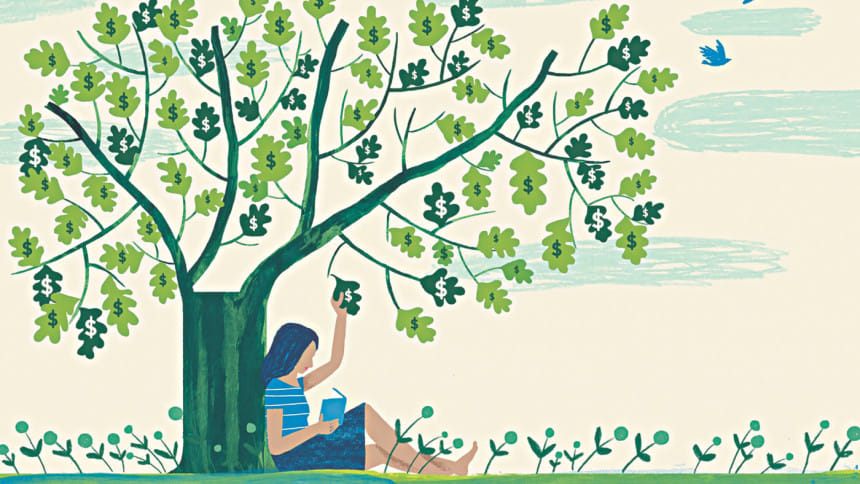Could universal basic income be the answer to ending poverty?

Universal basic income (UBI) is a concept that has come a long way from its primitive form back in the 16th century, when a Spanish Renaissance scholar named Johannes Ludovicus Vives suggested that the Mayor of Bruges give a minimum income to all citizens of the city. The concept has become widely accepted in countries like Finland, India, Namibia, the state of Alaska, etc.
The idea is to pay each and every individual a minimum income, regardless of whether they are employed or not. This income should be high enough to cover the bare necessities such as food and clothing and be untaxable. Whatever extra disposable income citizens earn through employment is theirs to keep.
According to the Financial Times, India has experimented with the UBI system in an unorthodox way, giving money to people mainly in rural areas like the southern state of Telangana, the eastern state of Odisha, etc. Conclusions haven't been drawn up yet, as the experiment is still ongoing. But it is believed that it has caused a dissipation in agrarian distress, which had risen because of corruption and unjust exclusion of poor people from anti-poverty programmes in India.
Namibia had a pilot project between the years 2008 and 2009 called the Big Income Grant (BIG). Grants in the form of UBI in the Otjivero-Omitara area had resulted in significantly lowered child malnutrition, a more productive workforce, greater affordability of education, a 20 percent drop in economic and poverty-related crimes.
Finland's experimentation with UBI yielded a more positive health-oriented result than a financial one. The two-year experiment with UBI ended in February 2019, with results such as reduced levels of stress, better health and ability to concentrate, according to a World Economic Forum article. However, there wasn't much change in regards to employment tendency among the group that received the UBI, mostly because implementing the UBI does not automatically grant people the skills required to be employed.
Now how would such a concept fare in an economy like ours?
Bangladesh is a country that is still wrought with extreme poverty. According to the Household Income and Expenditure Survey- 2016, 12.9 percent of our population lived in extreme poverty, and 24.3 percent were living in the upper-poverty line back in 2016. Although there is a possibility that the extreme poverty rate is now lower, it still plagues our economy substantially. Extreme poverty and poverty of any kind indicate that a part of the population is encumbered with the inability to access basic necessities for survival, regardless of their employment status.
In allocating a basic income for all people, the government will have to draw up a Consumer Price Index (CPI) to figure out which consumer goods are essential, and which of those should be taken into consideration. An untaxable monthly UBI of Tk 12,000 should be realistic in the sense that an income like this should be enough to fulfil the bare necessities like food, water, clothing and shared accommodations, given that our essentials are cheaper than in most other countries.
Since this system does not have any clear specifications on the demographic that should be able to earn a UBI, one suggestion would be to provide it to the population that is eligible for work, and the population that has retired. Children are not to be included in the roster.
There is a strong argument against UBI, which is that handing out free money to people might make them end up being lazier and more reluctant to work. While it is true that there will be a certain percentage of people leaving work and reducing their work hours, it is also true that those people would be more likely to take up self-development activities, like going for further studies, honing specific skills and caring for their families.
Back in the 1970s, an experiment of the UBI system on a group of people in Canada showed a 1 percent drop in the employment rate and around 10 percent drop in working hours. While they were out of work, those people used that extra time to care for their families or for self-development.
As people leave the workforce for such purposes, what the UBI does is create a more skilled labour force in the future that is capable of occupying jobs that require more knowledge-based skills rather than simple technical skills, or provide technical skills that are far more efficient than before.
That being said, the UBI system will be incredibly expensive to implement. According to the CIA's World Fact Book, it is estimated that 73.52 percent of Bangladesh's population will be above the age of 14 by July, 2020. Let's say, given that most children from poor families go to work when they are 15, the number of people eligible to receive the UBI will be 11.9 crore. And this entire system will cost Tk 1,42,922.9 crore to implement.
In addition to cost, implementing it will require massive restructuring. There is also a huge debate on where the money meant for the UBI system will come from, because it is impossible for taxes to be the only source of money for the system. With that said, it still stands that experimentation before implementation is an obvious prerequisite of putting the UBI system in place
The UBI system is highly malleable and the market will get to operate as it used to, balancing out oddities with its invisible hand. What sets this system apart is that it manages to close the gap between income levels, eradicate poverty in a single swoop and help people live a happier and less stressful life.
Araf Momen Aka is an undergraduate student of Jahangirnagar University.

 For all latest news, follow The Daily Star's Google News channel.
For all latest news, follow The Daily Star's Google News channel. 



Comments